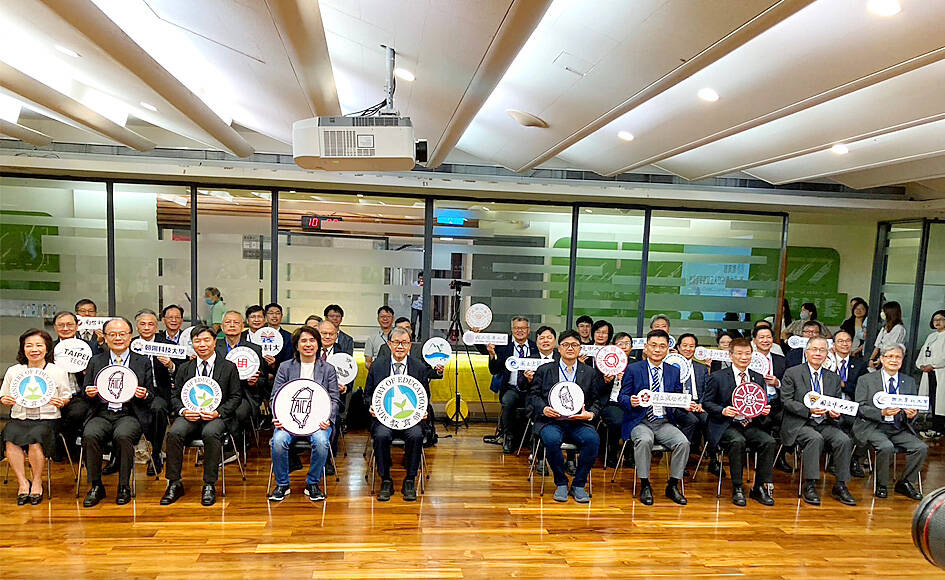Minister of Education Cheng Ying-yao (鄭英耀), along with representatives of 25 universities, yesterday announced the establishment of the Taiwan Artificial Intelligence College Alliance to enable students to take intercollegiate courses on artificial intelligence (AI) and obtain certificates.
The alliance, which begins official operations in the academic year starting this month, aims to prepare more than 10,000 students with AI-related expertise in the next three years, Cheng said.
In response to an urgent demand for AI talent in Taiwan’s technology industry, universities should have AI-related undergraduate courses, Cheng said, adding that the strategy must move from competition between universities, to intercollegiate cooperation and the forming of a “Team Taiwan.”

.Photo: Rachel Lin, Taipei Times
The alliance is led by the Ministry of Education and several universities, with National Taiwan University, National Tsing Hua University and National Cheng Kung University as the main institutions participating in the initial stage, while other universities would have an opportunity to join later, he said.
With the alliance’s launch, AI learning resources would be popularized in universities across the nation, and if students from other countries in the region want to learn about AI, Taiwan would be the best destination for them, Deputy Minister of Education Yeh Ping-cheng (葉丙成) said.
Based on the idea of “it takes a village to raise a child,” the ministry spent two months coordinating with top AI academics to overcome initial difficulties, Yeh said.
Students who complete the required courses would receive a program certificate from the ministry, he added.
“Industries can look for this certificate when they recruit AI talent,” he said.
The alliance plans to open four programs: AI exploration and application, AI industrial application, AI and natural language processing, and AI and visual technology application, Yeh said.
Each program would have five required courses, totaling 15 credits, and the maximum number of students for each course is set at 1,500, which could increase as more universities join the alliance, he said.
The alliance would have leading courses, satellite courses and regular courses, provided through an online digital learning platform, and students can interact with course instructors if they take the course synchronously, or with teaching assistants if they take them asynchronously, he said.
IBM Consulting, Taiwan manager Han Lin (林翰則) said the industry has a positive attitude about the alliance, and supports its establishment.
The alliance can integrate AI educational resources from universities across the nation to cultivate talent to meet a shortage of workers with AI specializations, he said.
IBM Consulting, Taiwan students who obtained the alliance’s certificate would be seen as having expertise in AI, so the company would consider recruiting them first, Lin said.

AIR SUPPORT: The Ministry of National Defense thanked the US for the delivery, adding that it was an indicator of the White House’s commitment to the Taiwan Relations Act Deputy Minister of National Defense Po Horng-huei (柏鴻輝) and Representative to the US Alexander Yui on Friday attended a delivery ceremony for the first of Taiwan’s long-awaited 66 F-16C/D Block 70 jets at a Lockheed Martin Corp factory in Greenville, South Carolina. “We are so proud to be the global home of the F-16 and to support Taiwan’s air defense capabilities,” US Representative William Timmons wrote on X, alongside a photograph of Taiwanese and US officials at the event. The F-16C/D Block 70 jets Taiwan ordered have the same capabilities as aircraft that had been upgraded to F-16Vs. The batch of Lockheed Martin

GRIDLOCK: The National Fire Agency’s Special Search and Rescue team is on standby to travel to the countries to help out with the rescue effort A powerful earthquake rocked Myanmar and neighboring Thailand yesterday, killing at least three people in Bangkok and burying dozens when a high-rise building under construction collapsed. Footage shared on social media from Myanmar’s second-largest city showed widespread destruction, raising fears that many were trapped under the rubble or killed. The magnitude 7.7 earthquake, with an epicenter near Mandalay in Myanmar, struck at midday and was followed by a strong magnitude 6.4 aftershock. The extent of death, injury and destruction — especially in Myanmar, which is embroiled in a civil war and where information is tightly controlled at the best of times —

Taiwan was ranked the fourth-safest country in the world with a score of 82.9, trailing only Andorra, the United Arab Emirates and Qatar in Numbeo’s Safety Index by Country report. Taiwan’s score improved by 0.1 points compared with last year’s mid-year report, which had Taiwan fourth with a score of 82.8. However, both scores were lower than in last year’s first review, when Taiwan scored 83.3, and are a long way from when Taiwan was named the second-safest country in the world in 2021, scoring 84.8. Taiwan ranked higher than Singapore in ninth with a score of 77.4 and Japan in 10th with

SECURITY RISK: If there is a conflict between China and Taiwan, ‘there would likely be significant consequences to global economic and security interests,’ it said China remains the top military and cyber threat to the US and continues to make progress on capabilities to seize Taiwan, a report by US intelligence agencies said on Tuesday. The report provides an overview of the “collective insights” of top US intelligence agencies about the security threats to the US posed by foreign nations and criminal organizations. In its Annual Threat Assessment, the agencies divided threats facing the US into two broad categories, “nonstate transnational criminals and terrorists” and “major state actors,” with China, Russia, Iran and North Korea named. Of those countries, “China presents the most comprehensive and robust military threat